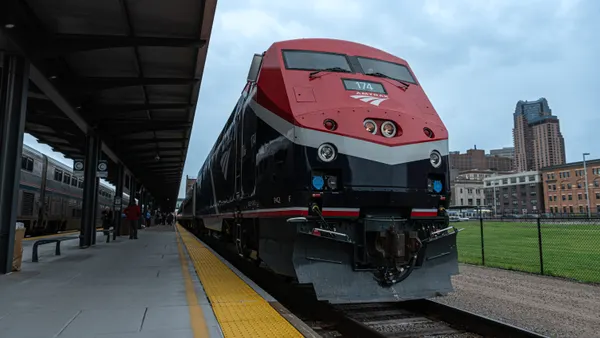Dive Brief:
- The CEO of electric scooter-sharing provider Bird has invited other scooter- and bike-share companies' CEOs to join him in signing the "Save Our Sidewalks" (SOS) pledge, which offers guidelines for operating a responsible vehicle-sharing business.
- The three principles of the SOS pledge are revenue sharing, responsible fleet growth and daily vehicle pickup, maintenance and repositioning.
- This week, Bird also announced it has expanded outside of its Southern California markets into San Francisco, San Jose, CA and Washington, DC.
Dive Insight:
The pledge's guidelines address several issues head-on that drum up criticism for bike- and scooter-share programs, especially customers leaving bikes in inappropriate places throughout cities.
Clutter has become a hot topic for dockless bike-share programs and service providers report employing a variety of methods to prevent bike littering, such as customer educational campaigns and bike tracking technology. One of the prime suggestions in the SOS pledge is designed to reduce and prevent dockless clutter. It suggests retrieving the vehicles every night and inspecting them, then repositioning them to where they're most needed.
Traditional bike-share operators usually do repositioning and maintenance at least once daily, and at least one dockless operator reports similar actions. LimeBike also uses the bikes' tracking systems to identify any tipped bikes that need attention. "We do our maintenance through foot patrols ... on-site they can immediately correct the situation and talk to folks using [the bikes] and educate them on how to use the bikes," said LimeBike spokesperson Jack Song.
Responsible program growth is another focus area for dockless bike- and scooter-sharing programs, and it has been accentuated by the situation in Dallas. Earlier this year, the city manager reprimanded dockless operators for customers' bike littering and told service providers to clean up the mess. But operators point out that the city allowed tens of thousands of dockless bikes onto their streets essentially overnight without first enacting regulations or formally setting up a business plan and consumer education programs. That's one factor that has prompted Austin to take its time in devising a plan before allowing dockless bike-sharing in the city. The SOS pledge encourages operators to avoid adding new vehicles into the system unless the existing ones are used at least three times a day, and to remove under-used vehicles.
The final guideline suggests a revenue-sharing plan in which dockless operators would give city governments $1 per vehicle per day. The money could be used to improve bike-friendly infrastructure such as bike lanes, maintenance and safe riding educational programs.
In his letter to other dockless operators, Bird CEO Travis VanderZanden said, "Although we are competitors, we all share a passion for the transformation we're bringing to American cities. As an industry, we need to lead not only on technology, but also on social responsibility and cooperation with city governments."












